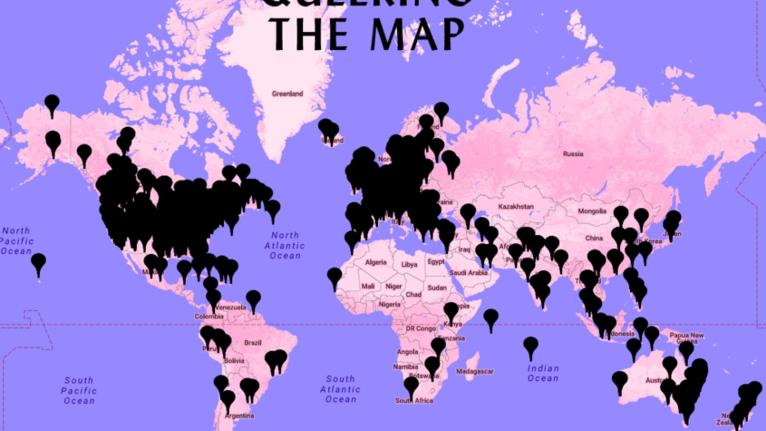
Queering the Map 2.0: A Roundtable About Interactivity, Temporality, & Ambiguity in Queer Digital Maps
In the thirteen years since Brown and Knopp’s original article Queering the Map was published, interactive web maps have emerged as a key facet of navigating and documenting queer space, both historical and contemporarily. Over this same period, the spatiality of queerness has shifted dramatically: as gayborhoods declined in their size and importance, apps like Grindr, Tinder, HER, Scruff, and Lex (among many others) have reimagined how queer individuals build community. This same period has also seen a growing interest in the queer past and attempts to document and interpret this history often through interactive maps. In this roundtable, interactive maps and queer geodata are discussed by the creators of both historic and contemporary interactive queer maps, seeking to gain a better understanding the changes, challenges, and opportunities of this form of media.
Megan Springate (she/they) is an historical archaeologist working in public engagement and education, and is Post-Doctoral Associate, Department of Anthropology, University of Maryland. She is the editor of LGBTQ America: A Theme Study of Lesbian, Gay, Bisexual, Transgender, and Queer History published by the National Park Service. They still oversee Historypin LGBTQ America at historypin.org/en/lgbtq-america.
Jen Jack Gieseking (they/he) is an urban and digital cultural geographer. They are Assistant Professor of Geography at the University of Kentucky. His first book, A Queer New York: Geographies of Lesbians, Dykes, and Queers, came out last fall with NYU Press. Jack launched An Everyday Queer New York as a companion site to the website, which includes maps of late 20th and early 21st century LGBTQ NYC commercial and activist history. The An Everyday Queer NY site can be found at jgieseking.org/AQNY/the-maps.
Jeff Ferzoco (he/him) has worked as a designer in urban planning, mapping and transportation spaces, and loves yanking stories out of the city with technology. He's currently working in cryptocurrency and living in Brooklyn, ready to dance and have fun again. His OUTgoing site is located at outgoingnyc.com.
Dr. Eric Gonzaba (he/him) is an Assistant Professor of American Studies at California State University, Fullerton. There he teaches courses on race and sexuality in the United States while working on a book exploring the history of gay male nightlife since the 1960s. His collaborative Mapping the Gay Guides site can be found at mappingthegayguides.org.
Lucas LaRochelle (they/them) is a designer and researcher whose work is concerned with queer and trans digital cultures, community-based archiving, and co-creative media. They are the founder of Queering The Map, a community generated counter-mapping project for digitally archiving LGBTQ2IA+ experience in relation to physical space. Their site is queeringthemap.com.
Joseph Hawkins (he/him) is the director of the ONE Archives at the USC Libraries and a Professor of Gender and Sexuality Studies at the University of Souther California. They are the creator of Queer Terrains, a map populated by students conducting research at the ONE Archives. Queer Terrains is located here: qt.